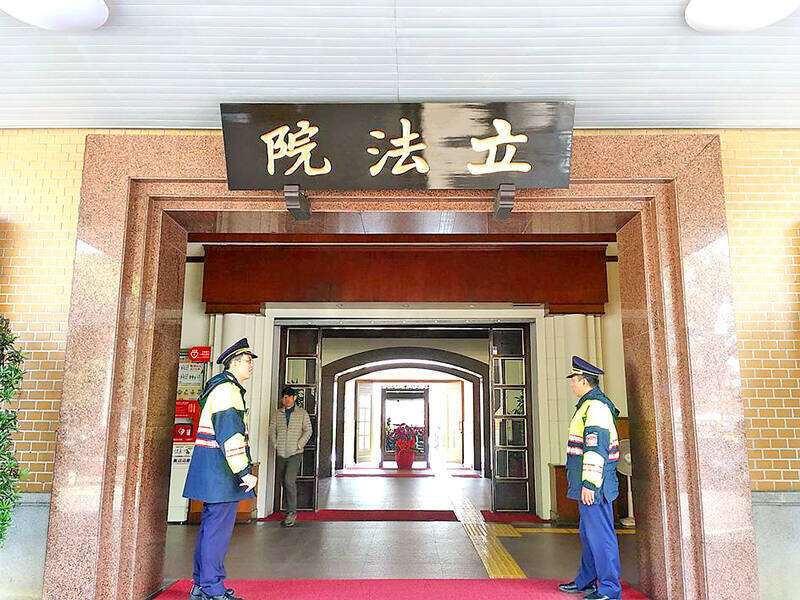Bipartisan cooperation to push forward national security bills is needed, Democratic Progressive Party (DPP) lawmakers said yesterday after the Chinese Nationalist Party (KMT) said that China is meddling in its chairperson election.
Former Taipei mayor Hau Lung-bin (郝龍斌), a KMT chairperson candidate, on Thursday said on Facebook that “external cyberwarriors” were interfering with the election, while former Broadcasting Corp of China chairman Jaw Shaw-kong (趙少康) yesterday said the “external forces” were from China and called for a national security investigation.
DPP Legislator Rosalia Wu (吳思瑤) yesterday said that the DPP has been the biggest victim of Chinese cognitive warfare, as it usually helps the KMT undermine DPP election campaigns.

Photo: Lin Liang-sheng, Taipei Times
The KMT has benefited from cyberwarfare, but now that its interests have been compromised, it has been made more aware of the problem and its severity, Wu said, adding that at least the KMT is willing to face the issue.
Chinese cognitive warfare has infiltrated the internal elections of political parties, which shows that it has become a serious national security issue for society and all political parties, she said, urging the KMT to work with the DPP to amend national security laws.
DPP Legislator Chen Kuan-ting (陳冠廷) said warnings about Chinese infiltration have long been criticized as “creating disagreements,” “exaggerating threats” or “manipulations with political ends.”
However, the accusations of Hau and Jaw show that the threat is real, and has become so severe that even the KMT’s internal elections are targeted, Chen said.
“When KMT members are experiencing the issue firsthand and publicly calling it Chinese interference, the threat is no longer ‘theoretical,’ but factual,” he said.
The Chinese threats pose challenges to not only the KMT, but also to the DPP, as both are Taiwanese parties, he said.
The governing and opposition parties do not have to agree on everything, but they must admit that external interference must be addressed through a collaborative effort, Chen said.
Only when the two sides work together for the national interest could they defend the nation against external threats, he said.
“Taiwan’s elections should be autonomously determined by Taiwanese. Any form of external interference constitute infringement upon democracy,” he added.
The incident shows that Taiwan needs a more comprehensive digital democratic safety net, Chen said.
Aside from blocking cognitive warfare via digital technology, the media literacy of the public should be enhanced to help them identify disinformation and malicious manipulations, he said, adding that political parties should build internal mechanisms to protect themselves from being exploited by Chinese forces.
Taiwan National Security Institute deputy secretary-general Ho Cheng-hui (何澄輝) said that external groups have long infiltrated Taiwan beyond just its elections.
China, Russia and other countries have used disinformation, including fake poll results, social media accounts and push notifications to exert influence on other countries’ political agendas, Ho said.
Chinese influence over the past few years has not only affected Taiwan, but also Japan and South Korea, he said.
It is important to have mechanisms in place to block cognitive warfare, otherwise the democratic system would be infiltrated, he said, adding that fair competitions in Taiwan’s democratic system could only be restored by promoting transparent regulations.
Additional reporting by Fang Wei-li

A preclearance service to facilitate entry for people traveling to select airports in Japan would be available from Thursday next week to Feb. 25 at Taiwan Taoyuan International Airport, Taoyuan International Airport Corp (TIAC) said on Tuesday. The service was first made available to Taiwanese travelers throughout the winter vacation of 2024 and during the Lunar New Year holiday. In addition to flights to the Japanese cities of Hakodate, Asahikawa, Akita, Sendai, Niigata, Okayama, Takamatsu, Kumamoto and Kagoshima, the service would be available to travelers to Kobe and Oita. The service can be accessed by passengers of 15 flight routes operated by

Chinese spouse and influencer Guan Guan’s (關關) residency permit has been revoked for repeatedly posting pro-China videos that threaten national security, the National Immigration Agency confirmed today. Guan Guan has said many controversial statements in her videos posted to Douyin (抖音), including “the red flag will soon be painted all over Taiwan” and “Taiwan is an inseparable part of China,” and expressing hope for expedited reunification. The agency last year received multiple reports alleging that Guan Guan had advocated for armed reunification. After verifying the reports, the agency last month issued a notice requiring her to appear and explain her actions. Guan

GIVE AND TAKE: Blood demand continues to rise each year, while fewer young donors are available due to the nation’s falling birthrate, a doctor said Blood donors can redeem points earned from donations to obtain limited edition Formosan black bear travel mugs, the Kaohsiung Blood Center said yesterday, as it announced a goal of stocking 20,000 units of blood prior to the Lunar New Year. The last month of the lunar year is National Blood Donation Month, when local centers seek to stockpile blood for use during the Lunar New Year holiday. The blood demand in southern Taiwan — including Tainan and Kaohsiung, as well as Chiayi, Pingtung, Penghu and Taitung counties — is about 2,000 units per day, the center said. The donation campaign aims to boost

The Central Weather Administration (CWA) said a magnitude 4.9 earthquake that struck off the coast of eastern Taiwan yesterday was an independent event and part of a stress-adjustment process. The earthquake occurred at 4:47pm, with its epicenter at sea about 45.4km south of Yilan County Hall at a depth of 5.9km, the CWA said. The quake's intensity, which gauges the actual effects of a temblor, was highest in several townships in Yilan and neighboring Hualien County, where it measured 4 on Taiwan's seven-tier intensity scale, the CWA said. Lin Po-yu (林柏佑), a division chief at the CWA's Seismological Center, told a news conference